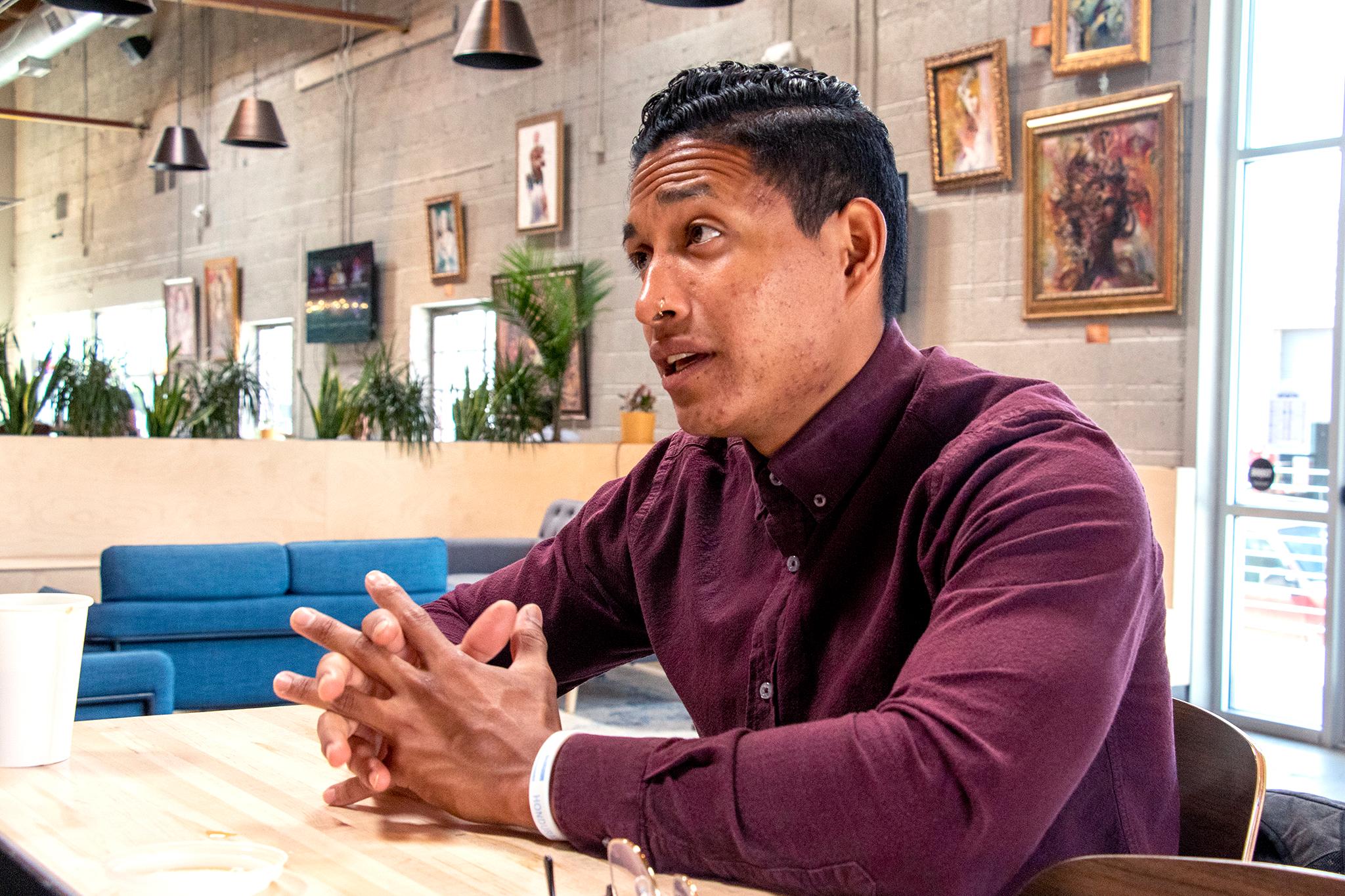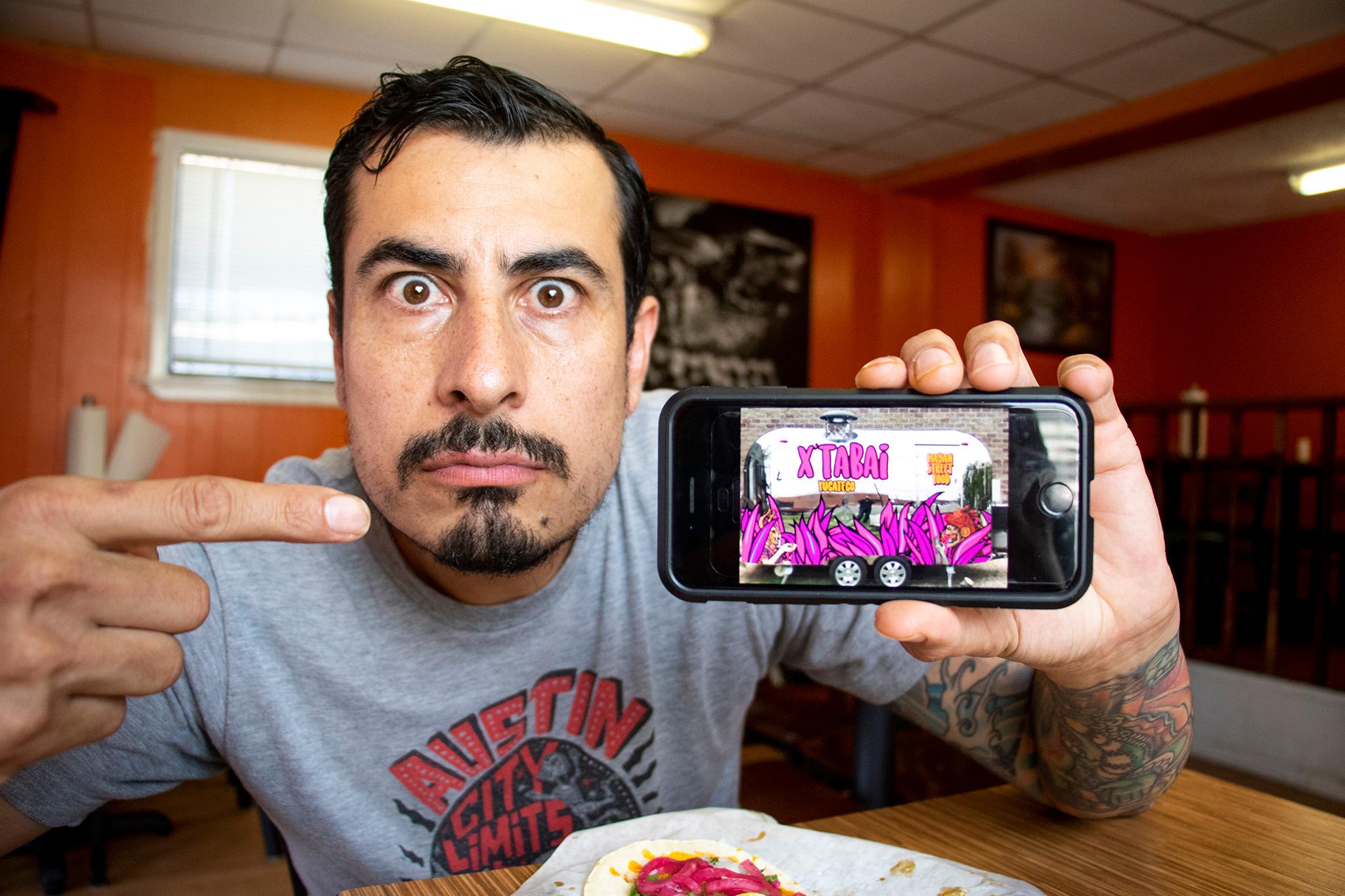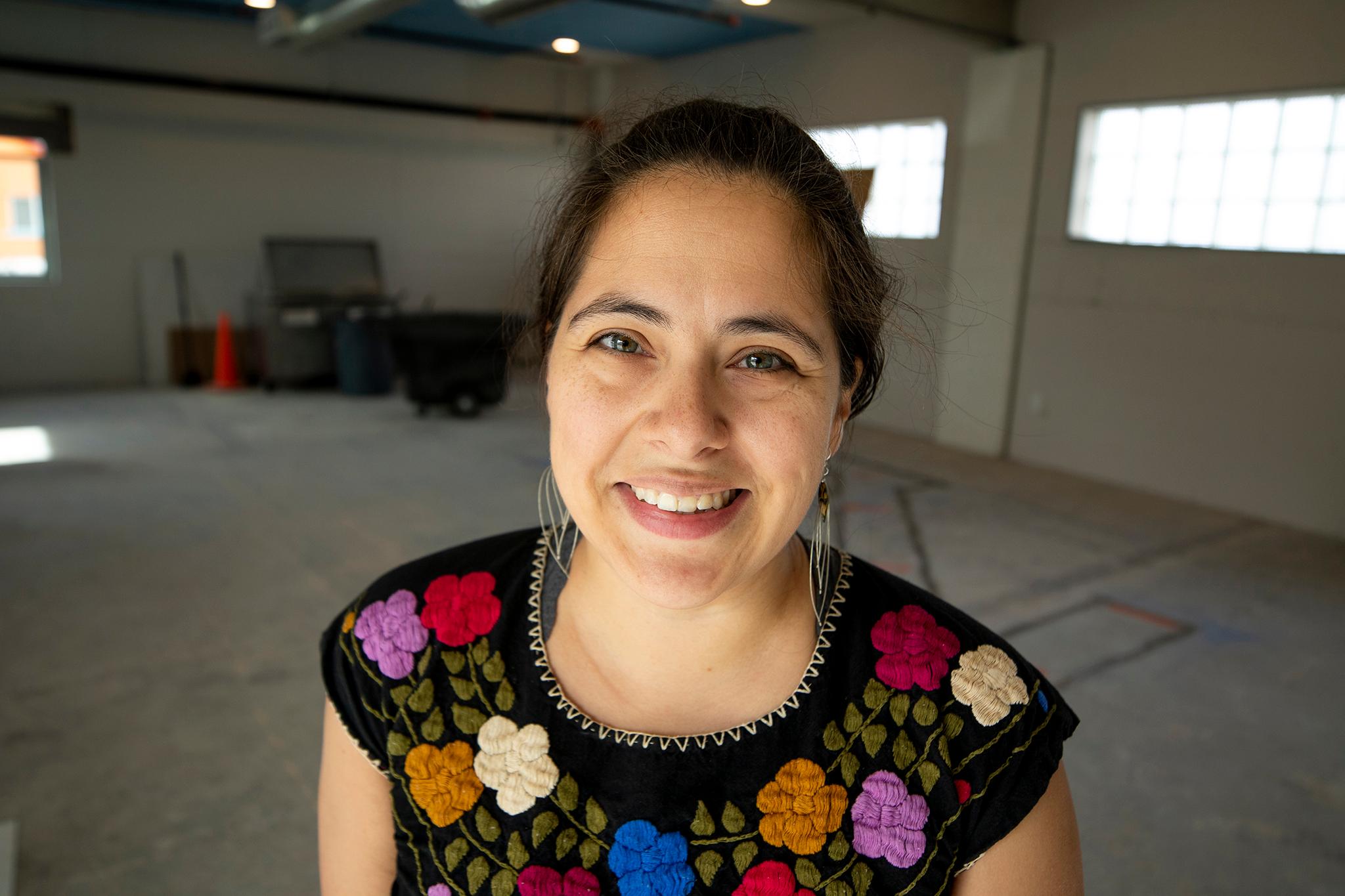As a child in Honduras, Edwin Sandoval saw how his grandmother kept sodas around as a treat for visitors. Or she might offer coffee, or slaughter a chicken to make soup for guests.
"The feeling that you get when you feed somebody, it's so nurturing," said Sandoval, who is now a chef in Denver. "Growing up, we didn't have much. It was always about really giving as much as you can to people to make them feel welcome."
Sandoval was four years old when their mother went to the United States to find work.
"When she came here, her main goal was to find ways to sustain her three kids back in Honduras," he said.
Their grandmother looked after the children until their mother brought them to join her in Colorado Springs six years later. What he didn't know when he he was living with his grandmother, Sandoval said, was that his family was sometimes food insecure.
"That's one of those things that my grandmother talks about a little more openly now," he said, saying she only recently told him a story of his older sister, on the phone with their mother, asking her to send money because they'd been eating a lot of beans and rice.
"I had beans. I had rice. I had fried plantains. Other people didn't have that," he said.
"Every day I wake up and I think about it and I try to get another step or two away from that," Sandoval said. "And to help other people get away from that."
Sandoval knows that hunger, food insecurity and limited access to nutritious meals also are realities in Denver. Saturday, he and other chefs are helping by cooking for a fundraiser for Re:Vision.
A decade ago Re: Vision, a nonprofit based in Sandoval's Westwood neighborhood started a backyard farming project that has grown from seven families in Westwood to a dozen southwest Denver neighborhoods and helped plant 2,000 gardens. Re: Vision's newest project is renovating its Morrison Road warehouse to house a gallery, event space and a commissary kitchen and other work areas for local entrepreneurs. In a few years, the warehouse is expected to be part of a campus that includes a full-service grocery store owned by the Westwood Food Cooperative. For now, a small but well-stocked cooperative shop based at Re: Vision's offices next door to the nonprofit's warehouse and urban farm is one of the few places in Westwood that offers fresh fruits and vegetables.
When he first moved to Westwood about five years ago, Sandoval usually did his shopping in Highland, where he was working at a restaurant. When he did need to pick something up closer to home, he began to realize he was living in a food desert. He found few shops, but plenty of "places that offer a sandwich for a dollar," he said. "But they don't necessarily tell you the nutritional value that's lacking."
A friend in the food business told Sandoval about Re: Vision, making a connection that has led to the chef teaching neighbors to cook at the nonprofit and learning to garden from its experts.
"I realized how much work goes into it, how much attention goes into it," he said of his year of tending vegetables. "Sometimes I would come home, it was like 2 in the morning and I'd think, 'Well, I can't go to sleep without watering the garden."
Now he gets his produce from the Re: Vision urban farm a half mile from his home.
For this edition of the annual Re: Vision fundraiser known as Buen Provecho, Sandoval is head chef of a team that will be serving specialties at the warehouse on Saturday. Other participants are Jose Avila of X'tabai Yucateco; Matilde Garcia of Mujeres Emprendedoras Cooperative; private chef Ocean Lopez; Gustavo Mejia of Bang Up to the Elephant!; Andrea Murdoch of Four Directions Cuisine; Dana Rodriguez of Work & Class and Super Mega Bien; Damaris Ronkanen of Cultura Craft Chocolate; and Sharif Villa Cruz of Mercantile.
Sandoval said the group shows the diversity immigrants have brought to the American table. In addition to food, the chefs have stories of tenacity and creativity to share.

Sandoval rose from teenage dishwasher in Colorado Springs restaurants to executive chef in Denver with a stint at culinary school in between. He recently launched his own company XATRUCHO to offer clients fine dining experiences in their homes as well as at weddings and corporate events. He said his mother, who had worked in fast-food restaurants when she first came to the United States, had not seen food as a career.
"She was like, 'I think you can do a lot more for yourself,'" Sandoval said.
But he had been hooked since the first time he stepped into a professional kitchen, one run by his sister's boyfriend at the time, and saw cooks working with knives and over dramatic flames.
"There were like the most badass guys I'd ever seen in my life," he said.
After years apart he had struggled to connect with his mother and stepfather. The kitchen crews provided an alternate family.
"If food is connection, I would say hunger is fuel," Sandoval said.
"The lack of necessities, that's what really lit the fire under my ass. I was like, 'I need to start moving around. Because things are not going to just happen."
One of his Buen Provecho co-chefs, Avila, also has been on the move. Avila came from a Mexican family that ran taco stands.
"That was my early prep: chopping onions and limes outside subways in Mexico City," Avila said.
At 20, he came to the Denver area, where an uncle had a construction business. One day on a site showed him that building wasn't the industry for him. He got a job as a cashier at a Cherry Creek restaurant. When the manager discovered Avila's English wasn't up to dealing with customers, he was switched to washing dishes. Avila honed his English poring over the lyrics on the sleeves of albums by Limp Bizkit, Dr. Dre and other favorites, Avila said, laughing now at the memory.
He went on to become chef and co-owner at Machete Tequila + Tacos. His X'tabai Yucateco is a new business and a new cuisine for him. He will offer the smoky flavors of the Yucatan out of an Airstream trailer.

La Calle Taqueria y Carnitas is a favorite of Avila, a Valverde restaurant where he can settle at a table as if he were at home. He teased a toddler at a nearby table before getting back to a conversation about food and culture. Talking about problems over a meal can lead to solutions, he said.
"If food is conversation, hunger is silence," Avila said.
Ronkanen, a dessert chef on the Buen Provecho team, has traveled in Latin America for conversations about cacao, from which chocolate is derived. She met farmers and found companies she trusts to source organic products bought at fair prices for her confections.
Ronkanen grew up in Denver and went to Massachusetts to earn degrees in physics and psychology from Tufts University. She was always interested in food and cooking, especially specialties she remembers from visits to her grandmother in Mexico. Her last year at school, she worked at an Italian restaurant, learning to make appetizers and desserts in a professional kitchen.
After one and a half years, missing her family, she returned to Denver, where she got more food industry experience. She was feeling burned out when a cafe she was working at closed down in 2011. She returned to a law firm where she had worked in high school. Still drawn to food, she and a partner started a chocolate business on the side while she was working as office manager for the law firm.
Her partner left to concentrate on event planning in 2014. Ronkanen decided she, too, needed to decide where to focus her energies. She chose chocolate and found a new partner, a Californian transplant to Denver who was an experienced chocolatier. He returned to California in 2017 to start his own business, and now Cultura Craft Chocolate is all Ronkanen's.
Her husband, a soccer coach who used to play the game with a member of Re: Vision's board, introduced Ronkanen to the nonprofit. She was particularly impressed by the strategy of addressing food security by encouraging families to grow their own fruits and vegetables.
"I thought that was so cool," she said. "And they are so beautiful, the gardens."

Her mother, raising three children on her own, sometimes relied on food stamps.
"My mom made sure we did not go hungry," she said, adding her mother remains an important source of support.
Ronkanen found Re: Vision was refining ideas for its warehouse around the time she was considering moving away from making chocolates in commercial kitchens to supply farmer's markets, craft and food fairs and other venues. In November, she will open a chocolate-based cafe at the warehouse.
Re: Vision "wanted some kind of space here that was food and beverage," she said in an interview her almost-finished cafe. "I felt really honored they thought I could be a positive addition to this space."
In Haiti, Ronkanen sampled a cold beverage of pulp from cacao seeds soaked in water that she likened to a Mexican agua fresca. The cacao beverage will be on the menu at her Re: Vision cafe, as well the Mexican hot chocolate for which Cultura has become known and champurrado, a thick corn-based drink flavored with chocolate. Both the hot chocolate and champurrado are flavors that make her think of her grandmother.
Westwood "feels like a community, people are supporting one another," she said. "Re: Vision is part of the community. That's what makes it possible for them to tackle hunger."
"Food to me is about sharing in community and culture."













